50 Sales Probing Questions to Improve Buyer Conversations
Casey O'Connor
High sales performance relies on effective questioning from sales reps. Every stage of the sales process, from prospecting to negotiation, requires a salesperson to ask questions.
The most successful sales professionals understand not only when to ask questions but how. Surface-level questions will only drive a meeting so far forward; reps need to ask probing questions to get to the heart of what a prospect needs.
Mastering the act of asking skillfully-phrased probing questions can:
- Grow your pipeline
- Shorten your sales cycle
- Improve customer success rates
In this article, we’ll go over everything you need to know about thought-provoking probing questions, including the six standard types, real-world examples, and how to avoid making your client feel pressured when you ask them.
Here’s what we’ll cover:
- What Is a Probing Question?
- Benefits of Asking Probing Questions
- Probing vs. Clarifying Questions
- When Should You Use Probing Questions?
- Types of Probing Questions
- How to Avoid “Leading” Questions
- Tips for Great Probing Questions
- 50 Sales Probing Question Examples
What Is a Probing Question?
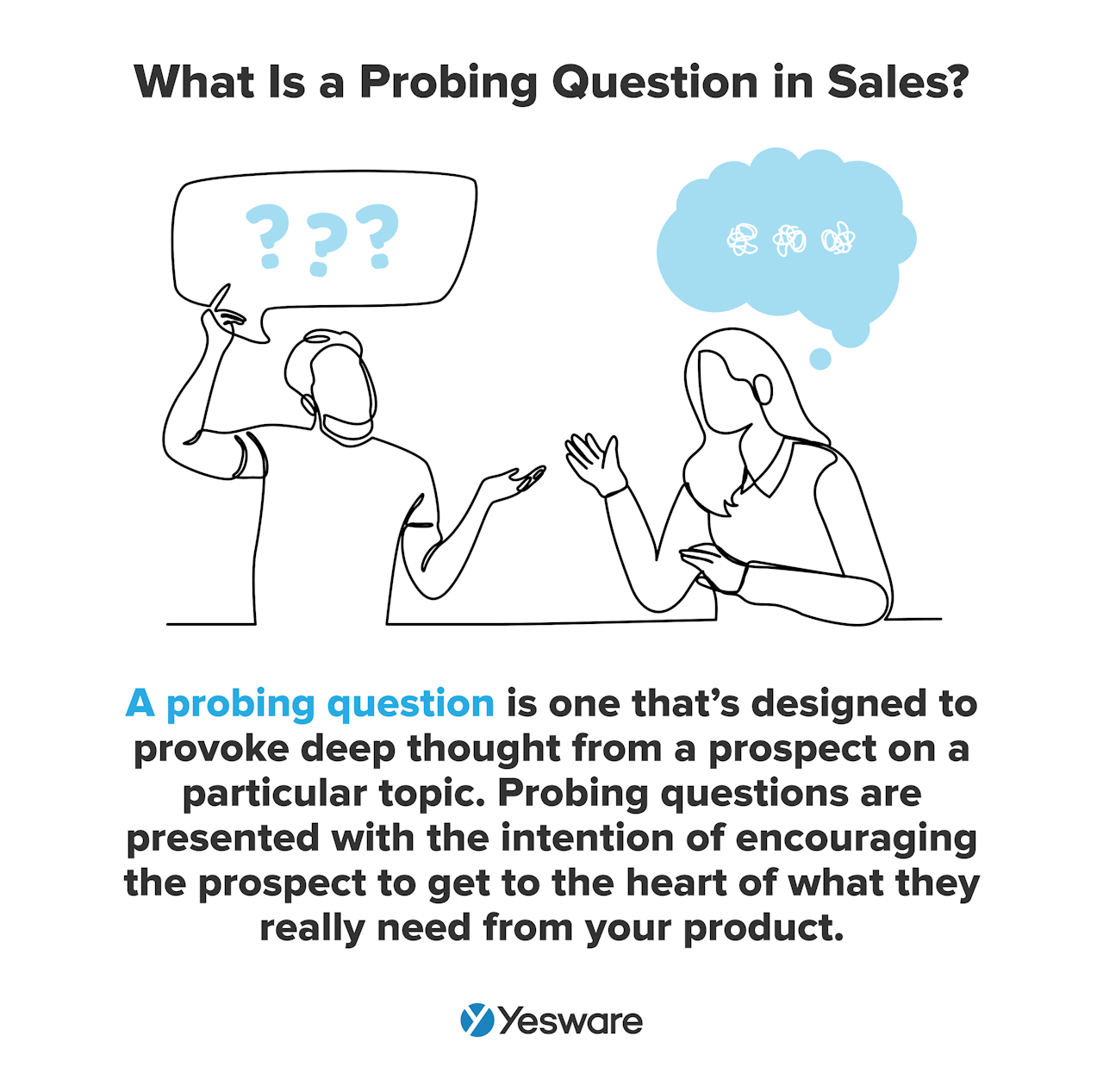 A probing question is one that’s designed to provoke deep thought from a prospect on a particular topic. Probing questions are presented with the intention of encouraging the prospect to get to the heart of what they really need from your product.
A probing question is one that’s designed to provoke deep thought from a prospect on a particular topic. Probing questions are presented with the intention of encouraging the prospect to get to the heart of what they really need from your product.
Probing questions can be leveraged throughout every stage of the sales pipeline.
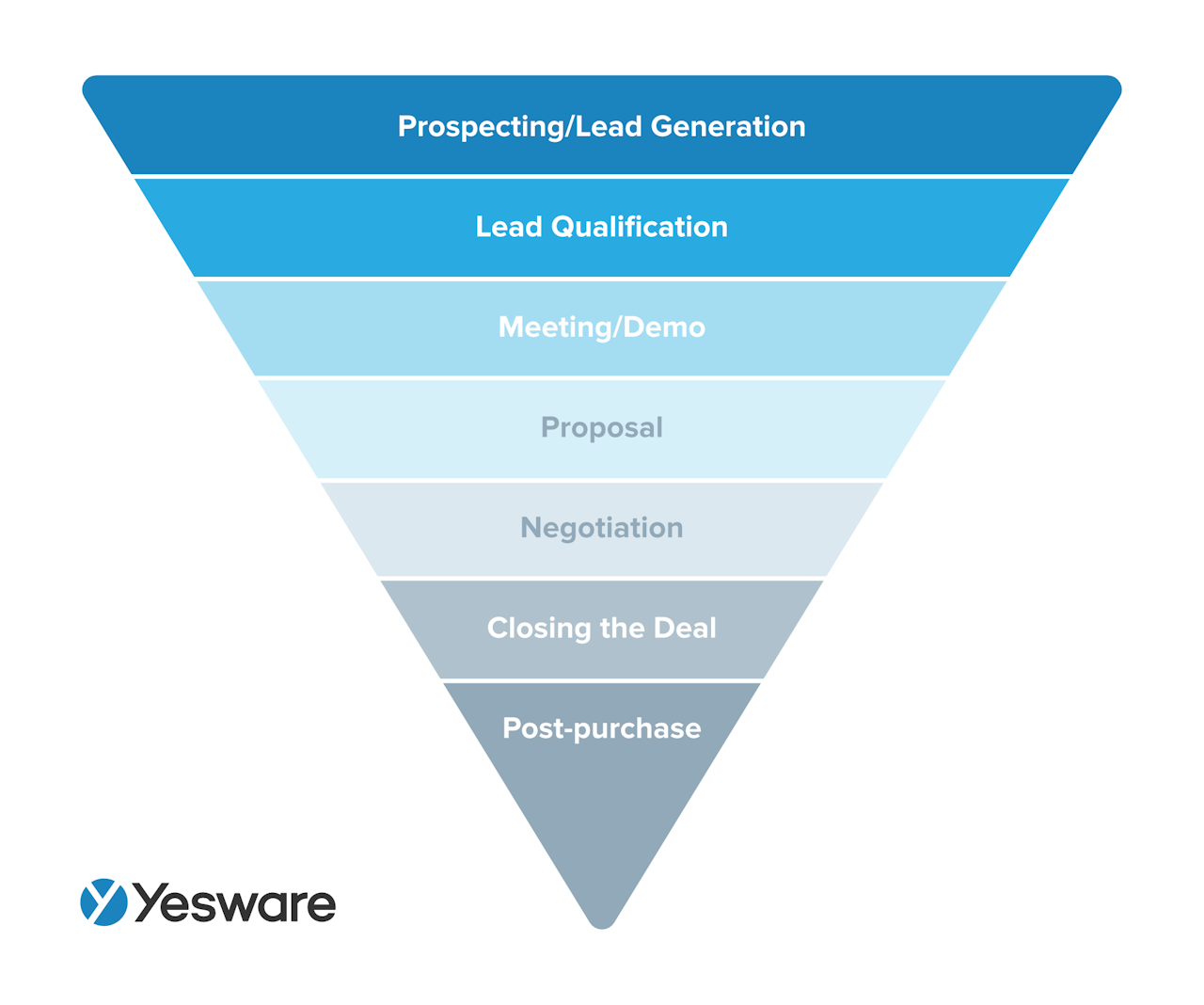
When delivered correctly, great probing sales questions can help a prospect build trust with the seller and prompt them to offer candid information about their pain points.
The right series of questions can enable sellers to collect the kind of information that ultimately helps the sales rep close valuable, mutually-beneficial deals.
Becoming effective at different probing techniques can take some practice. The first aspect to understand is that probing questions are always open-ended questions. 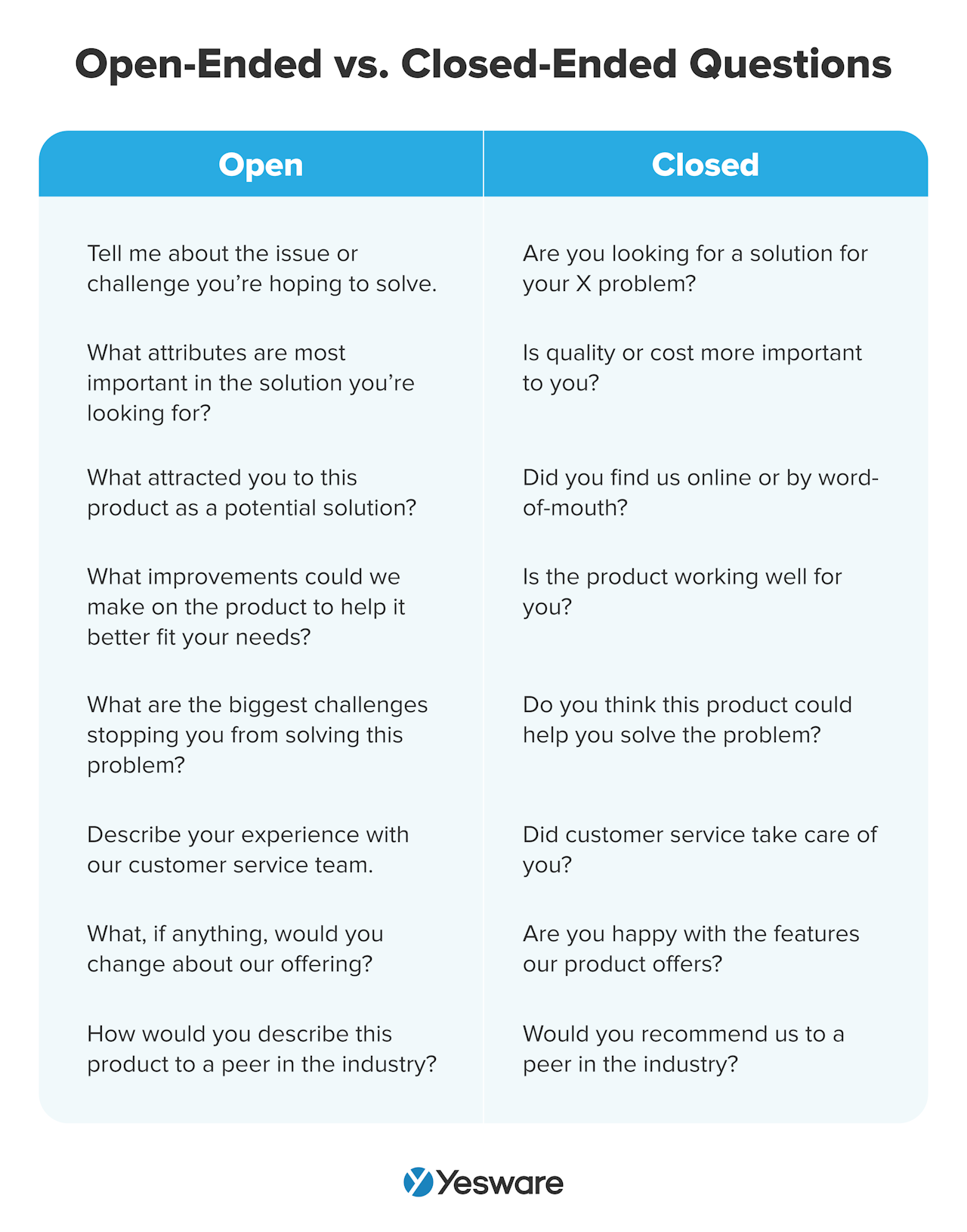 To be clear, though, probing questions are more than just “open-ended.” In fact, they’re usually quite a bit deeper and more thought-provoking than most discovery questions.
To be clear, though, probing questions are more than just “open-ended.” In fact, they’re usually quite a bit deeper and more thought-provoking than most discovery questions.
Think of it this way: Discovery questions help sales reps discover the issue. Probing questions help them develop a strategy for positioning your product as the solution.
Benefits of Asking Probing Questions
Effective probing questioning techniques will:
Grow Your Pipeline
Sales reps and SDRs can learn how to leverage probing questions to quickly qualify leads. They can then offer the marketing team feedback about the characteristics of best-fit clients, enabling them to optimize their efforts for attracting more highly-qualified leads.
Shorten the Sales Cycle
Probing questions can be highly effective at every stage of the sales process. Reps can save valuable time in everything from prospecting to overcoming objections when they learn to ask the right questions at the right time.
Improve Customer Success
The better a sales rep becomes at asking deep questions, the more likely they are to deliver the exact value each prospect genuinely needs.
Probing questions throughout the sales process can help account executives and customer success teams support the customer base in ways uniquely meaningful to them.
Ultimately, probing questions are so powerful because they bring meaningful personalization to the sales process. Don’t underestimate the impact of this — 44% of clients report they’re likely to take their business elsewhere in case of subpar personalization efforts.
Probing vs. Clarifying Questions
Though the terms “probing” and “clarifying” are in the same vein when referring to types of questions, they actually represent two very different concepts.
Probing questions leave room for a lot of subjectivity. Sellers ask probing questions when they want the respondent to think more deeply about and offer their own take on a certain topic or idea.
Clarifying questions, on the other hand, are straightforward and objective. Clarifying questions and their answers are based on facts.
Clarifying questions are designed to elicit additional specific information from the responder that helps the questioner better understand the subject being discussed.
Here are a few examples of clarifying questions:
Is that what you said?
Did I summarize your thoughts correctly?
What decision-making matrix did you use to arrive here?
Did I hear you correctly when you said…?
Sellers ask clarifying questions in order to have the information they need to ask effective probing questions.
When Should You Use Probing Questions?
Sales reps can leverage probing questions at various points throughout the sales process.
Here are some of the most common opportunities to use probing questions:
- During/after a sales presentation or demo
- During/after sales training or coaching
- After someone finishes telling a story to ensure you didn’t miss the point or to learn more about the speaker’s viewpoint of the events
- When you sense that a prospect is having trouble expressing exactly what they mean
- To learn more about a prospect’s thought process or decision-making framework
- When you’re learning more about a new prospect’s needs
Most probing questions should occur naturally throughout sales conversations; there isn’t really a right or a wrong time to ask them.
Sales reps should feel free to use clarifying questions, probing questions, and whatever other effective sales conversation techniques that help them qualify prospects and create successful solutions.
Types of Probing Questions + Examples
There are six primary types of effective probing questions, each with its own nuances, specific points, and optimal timing. 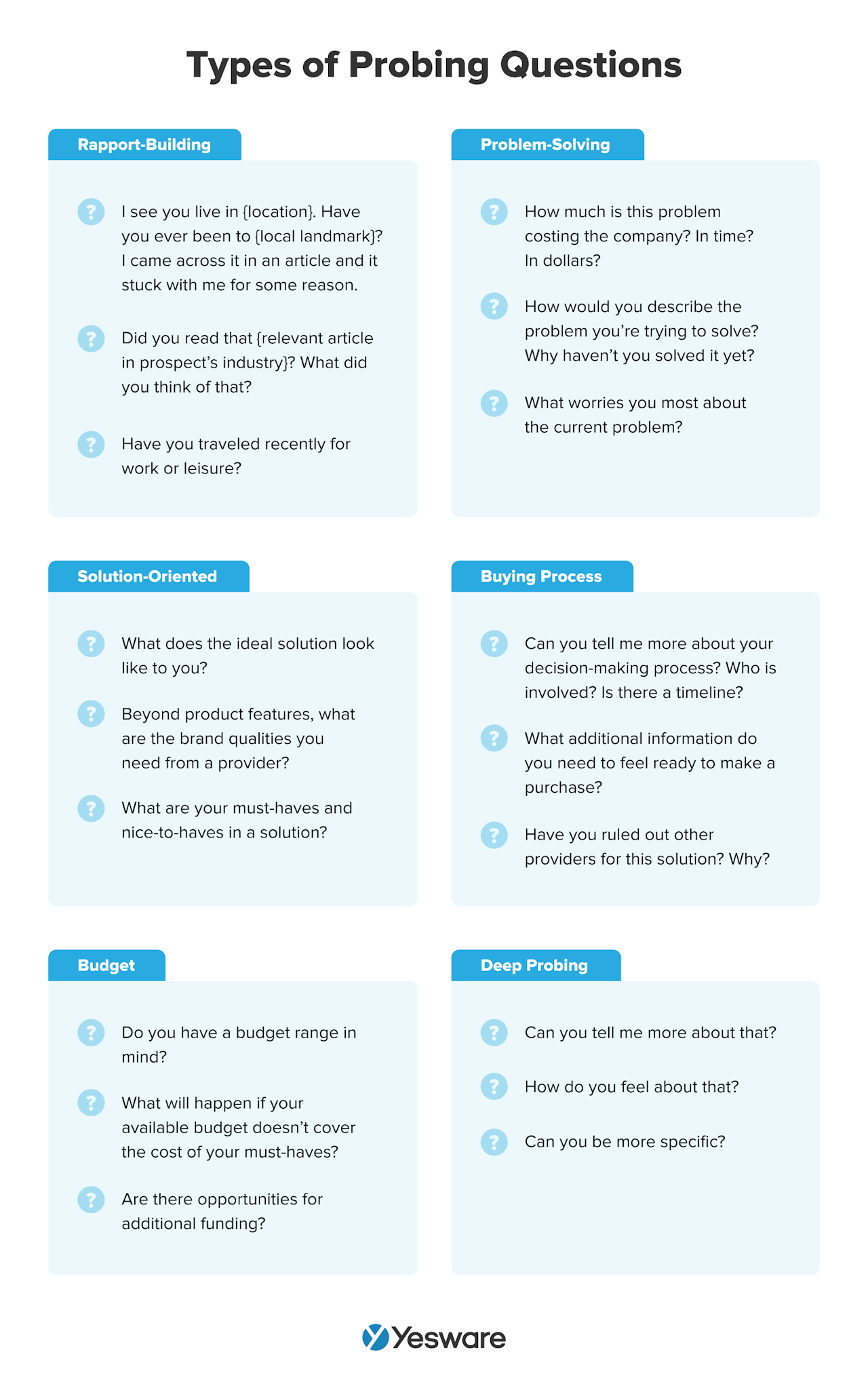
1. Rapport-Building
Some probing questions are designed to build rapport and trust with prospects. Skilled salespeople can use a buyer’s personality type to help them decide which kinds of questions will be most effective.
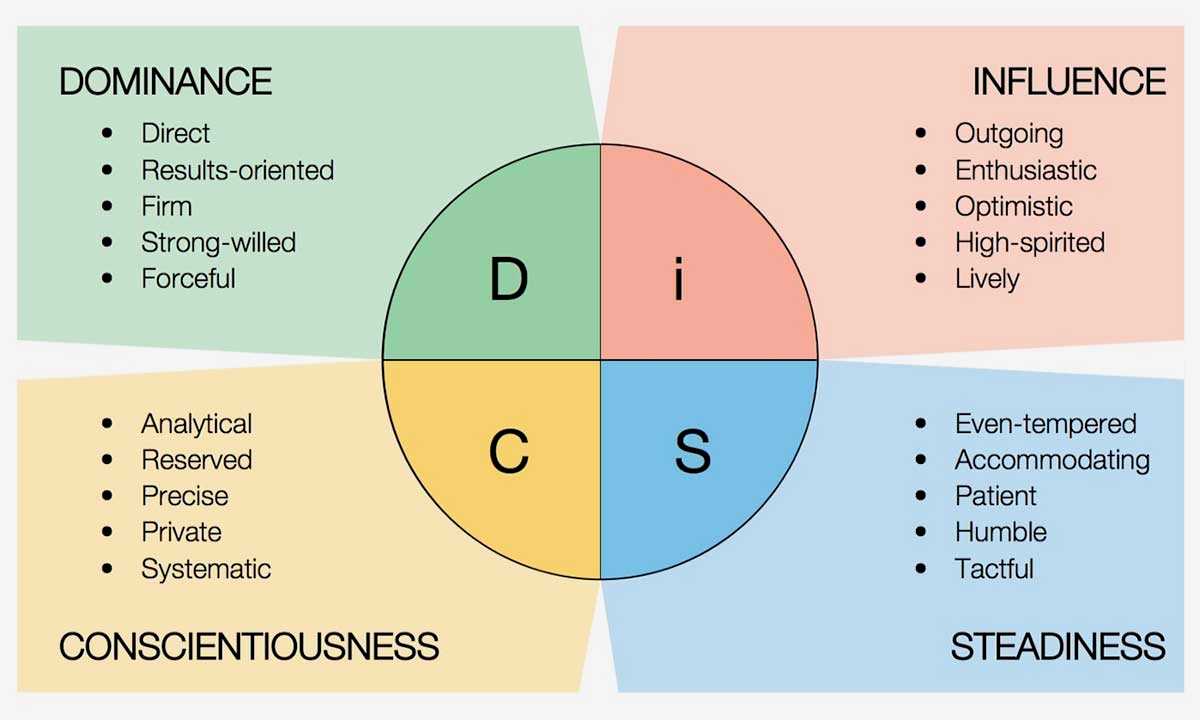
These probing questions aren’t meant to be idle small talk; use this time wisely, even if you’re not talking about deal terms yet. Building rapport with good questions creates a critical foundation for a successful sale — over 80% of buyers report that trust is a deal-maker or deal-breaker in their buying decision.
Examples of rapport-building probing questions include:
- I see you live in ___________. Have you ever been to {local landmark}? I came across it in an article and it stuck with me for some reason.
- Did you read that {relevant article in prospect’s industry}? What did you think of that?
- Have you traveled recently for work or leisure?
2. Problem-Solving
Some of the most popular probing questions are the ones designed to uncover the exact nature of the prospect’s problem. Sales reps ask these when they want to know the core of the prospect’s deepest pains and motivations.
Sales reps can feel comfortable asking problem-solving questions relatively early in the sales process, usually right after some rapport is built.
Examples of problem-solving probing questions include:
- How much is this problem costing the company? In time? In dollars?
- How would you describe the problem you’re trying to solve? Why haven’t you solved it yet?
- What worries you most about the current problem?
3. Solution Questions
Solution-oriented probing questions should help steer the prospect into vocalizing their ideal outcome to the problem.
If prospects can express what exactly they yearn for in a solution, sellers can use that feedback to position their own product as the one best suited to their specific needs.
This line of questioning should be reserved until after the prospect and seller have a mutual understanding of the prospect’s problem.
Examples of solution-oriented probing questions include:
- What does the ideal solution look like to you?
- Beyond product features, what are the brand qualities you need from a provider?
- What are your must-haves and nice-to-haves in a solution?
4. Buying Process
Probing questions about the buying process help sales reps understand how to navigate the sales process in the way that delivers the most value to that particular prospect.
These are best received after the problem and solution have both been discussed.
Examples of probing questions about the buying process include:
- Can you tell me more about your decision-making process? Who is involved? Is there a timeline?
- What additional information do you need to feel ready to make a purchase?
- Have you ruled out other providers for this solution? Why?
5. Budget Questions
Like it or not, all sales conversations must include details about the prospect’s budget. Probing questions around this topic can help sales professionals understand where the prospect places the highest value, and position themself as the best way to deliver it.
Probing questions around the budget can also help sales reps work with prospects to find additional sources of funding.
Questions about the budget can be asked at around the same time you ask about the buying process.
Examples of budgetary probing questions include:
- Do you have a budget range in mind?
- What will happen if your available budget doesn’t cover the cost of your must-haves?
- Are there opportunities for additional funding?
6. Deep Probing
Deep probing questions are classified as any other open question that requires critical thinking.
These “miscellaneous” types can technically be asked any time after rapport is established, but take that rule with a grain of thought. Some probing questions are more sensitive than others, so use your judgment about appropriate delivery timing.
Examples of deep probing questions include:
- Can you tell me more about that?
- How do you feel about that?
- Can you be more specific?
Remember that the intention of asking these types of questions is to get the prospect to “open up” and share some of their deepest frustrations. Although there are six “types” of probing questions, don’t treat them as cookie-cutter content.
Any hint of a script, or attempt to make your question seem like a certain “type” will likely make the buyer put their guard up.
Tip: When talking to prospects, it’s important to understand psychology-backed principles on verbal and nonverbal communication. Grab our free ebook below to help you persuade, connect, and uncover buyer concerns in your sales conversations.
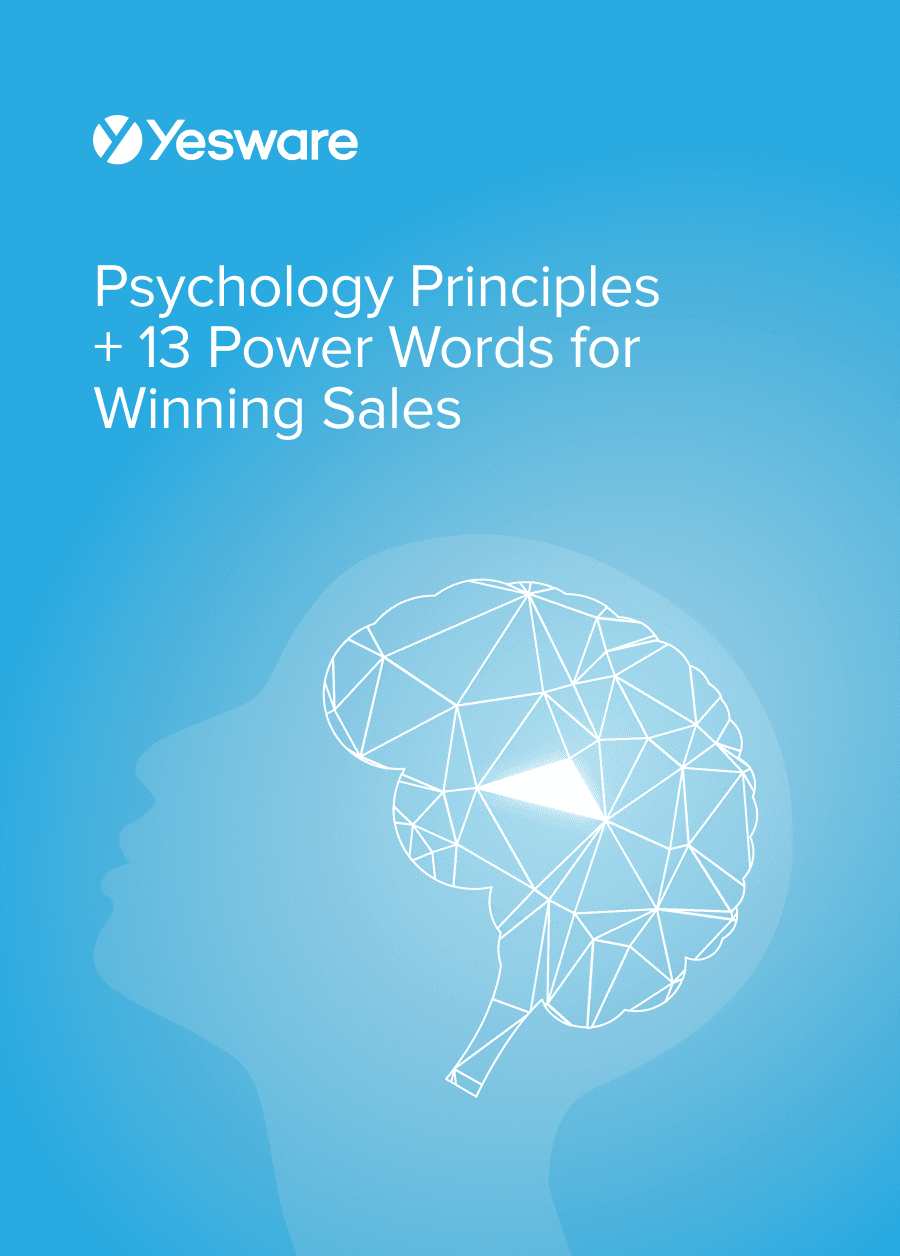 Psychology Principles + 13 Power Words for Winning SalesData-backed psychological principles, nonverbal cues, and persuasive phrases to win more deals.
Psychology Principles + 13 Power Words for Winning SalesData-backed psychological principles, nonverbal cues, and persuasive phrases to win more deals.
How to Avoid “Leading” Questions
Be careful not to confuse “probing questions” with “leading” ones. While probing questions aim to get to the heart of what a prospect truly thinks or feels, a leading question attempts to sway a prospect’s answer through the way it’s present.
Leading questions are biased and are designed to “lead” the responder toward answering in line with a particular viewpoint, usually that of the questioner.
Probing questions, on the other hand, attempt to guide the prospect toward reporting authentically on their own viewpoints.
Tips for Great Probing Questions
Remember that becoming skilled at asking probing questions takes time and practice. Keep the following tips in mind as you master this skill.
Practice Your Timing
Sometimes, the timing of the question is as important as the content itself. Try to classify your most common probing questions by type according to the outline above, and ask them within their recommended timeframe for best results.
Use Active Listening Skills
Your body language and verbal cues can go a long way in helping your prospect feel more comfortable in opening up to your questions. Try using active listening skills to help your prospects feel more trusting toward you. 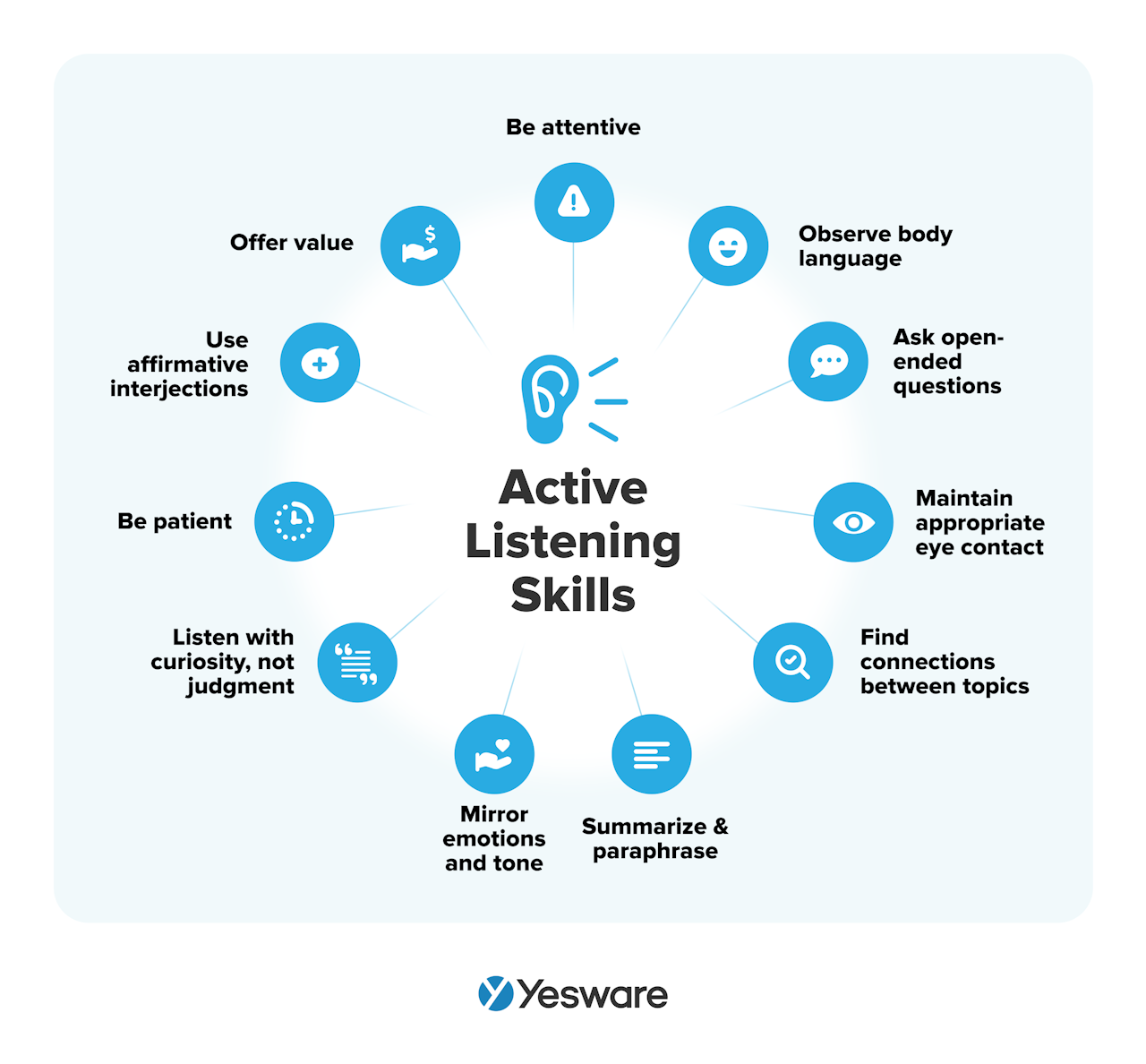 It’s particularly important for sales reps to be attuned to and reflect on any feelings that a prospect displays.
It’s particularly important for sales reps to be attuned to and reflect on any feelings that a prospect displays.
Get Rid of Your Bias
Remember — stay away from leading questions. It’s natural for you to think that your solution is the best on the market, but avoid pushing your prospect into prematurely adopting the same point of view. Make sure the questions generate the prospect’s own opinion, not ask them to reiterate your own.
50 Sales Probing Question Examples
- Why do you think that is?
- What would need to change within your organization for you to accomplish this?
- How did you arrive at this conclusion?
- What is your biggest fear related to this issue?
- What is the best-case scenario, in your opinion?
- What do you think is the root of the problem?
- Is this problem unique to this organization, or is it industry-wide?
- What are the long-term effects of this ongoing challenge?
- What are the intangible or trickle-down effects?
- How did you decide/determine…?
- What is the connection between… and …?
- How can we help you and your team?
- Could you please give me some background on this?
- Tell me more.
- What goals and objectives do you have?
- What is your biggest challenge right now?
- What three primary outcomes are you hoping for from this?
- Can you give me an example?
- Can you be more specific?
- How much more productive could your team be if the problem did not exist?
- If you could design the perfect solution, what would it look like? Give as much detail as possible.
- Is there a deadline or other sense of urgency?
- What are your top three non-negotiables that your chosen solution has to have?
- How important is it to your team to solve this problem (on a scale of 1 – 10)?
- What other options are you currently looking at?
- In a perfect world, what would you like to see happen with this?
- What are you or your team currently doing to address the problem?
- Can you put an amount on the problem in terms of cost to your organization on a weekly, monthly, or annual basis?
- Looking at this from a point of lost sales, how much is one sale worth to the company?
- How much is the issue/problem costing you in time/money/resources/staff/energy?
- What kind of ROI are you aiming for with a solution?
- How do you handle budget considerations?
- Who is on the decision-making team? Who is ultimately responsible for this?
- What has prompted you to want to look into this now?
- What other factors have we not discussed that are important to you?
- Does this affect other parts of the business?
- What’s your role in this situation/issue/problem?
- What’s your ideal outcome for using this solution?
- What makes this purchase important to you?
- What happens if you don’t buy our product or find another solution?
- What features are you most interested in?
- What makes you excited about our product or an overall solution?
- What concerns do you have about our product?
- How will you use the potential savings?
- Who has the final say on purchasing in your company?
- Can you elaborate on that?
- Can you explain what you mean by that?
- How does decision-making work at your business?
- Can you tell me about your team?
- What do you value most?
Have you practiced using probing questions? What was the outcome? They can feel challenging and even uncomfortable at first, but with time and practice, they can become second nature.
This guide was updated on March 29, 2023.
Get sales tips and strategies delivered straight to your inbox.
Yesware will help you generate more sales right from your inbox. Try our Outlook add-on or Gmail Chrome extension for free, forever!
Related Articles
Casey O'Connor
Casey O'Connor
Jenny Keohane
Sales, deal management, and communication tips for your inbox

